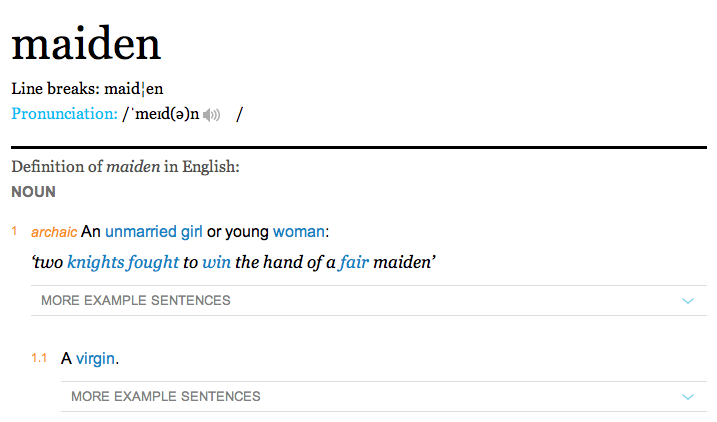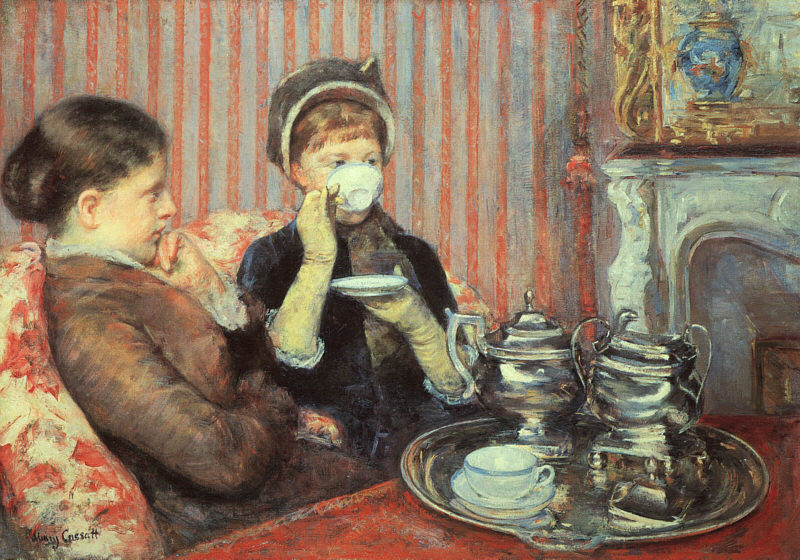In my former life, back before I had a kid and became a yoga teacher and started a cuss-filled feminist blog, I worked in the financing department of a large international bank. A few months after I started working there (and, coincidentally, a few months after I got married), one of the higher-ups was chatting me and my coworkers up when, out of nowhere, he said:
“Anne, is Thériault your married name or your maiden name?”
Flustered, I replied, “It’s just my regular name.”
“What do you mean by that?” he asked, totally nonplussed.
“I mean…it’s the name I was born with? I didn’t change my name when I got married, if that’s what you want to know.”
“So it’s your maiden name,” he said, his tone landing somewhere between condescending and wink-wink-I-get-it-you’re-making-a-joke.
But I wasn’t making a joke — I actually do really hate the term “maiden name” and will use all kinds of verbal gymnastics in order to avoid using it. Not only do I think it’s a gross term to use (more on that later), but it’s also wildly inaccurate.
The term “maiden” is an archaic term meaning an unmarried girl or young woman, and is synonymous with “female virgin.” I know that this may come as a surprise, but — I am literally none of those things. I’m actually a mean old hag who gets laid on the regular, so referring to my last name as my “maiden name” does not make any sense. I am not a “maiden” in any sense of the word; you may as well call it my slutty old crone name*.

So why is the term “maiden name” not just incorrect but also totally problematic? Well, because it’s based on several outdated assumptions. First of all, there’s the idea that a woman is not an autonomous person but rather a thing belongs to a man, and her last name signifies which man she belongs to; until she marries, she belongs to her father, and then after she marries, she belongs to her husband. Referring to a last name as a “maiden name” reinforces the idea that it’s a transitory type of name — not a woman’s real last name, but rather just the name she keeps until she finally fulfills her lady-destiny and lands a man. Second of all, there’s all kinds of weird purity bullshit happening here. We’re basically referring to the last name a woman is given at birth as her virgin name, the implication being that she won’t have sex until she’s married, at which point she will take her husband’s name.
I mean, I haven’t done any studies and I don’t have a lot of firm data to back this up, but I’m going to guess that only 0.1 per cent of the women over the age of 20 who still go by their maiden names are people who have never been sexually active. Like, don’t quote me on that or anything, but seriously. Come on. Other than the unmarried adult faction of the Duggar clan, how many grownups out there have never had sex? While there are for sure lots of people out there who aren’t regularly engaging in sexual activity, most of them have tried it at least once. Even the majority of the asexual people I know wouldn’t describe themselves as “virgins,” and most of them have experimented with sex at some point or another (which is often how they know it’s not for them).
It’s pretty telling that there’s no male equivalent to the term maiden name. This is because men have always been considered people, and therefore have always been entitled to their last names — unlike women, who traditionally only ever get to borrow a last name from whichever man she has the closest relationship to. People often don’t want to admit that last names are a form of showing ownership, and while I get that we don’t legally use them in this way anymore, there are still a lot of weird vestiges from the time when women were considered to be less than human.
Like, if everyone’s so equal and not-patriarchal now, how come dudes almost never want to take their wives’ names when they get married? Whenever I have the should-women-change-their-name-when-they-get-married debate, one reason I often hear is that a married couple with the same last name somehow represents a stronger, more unified front than a couple with different last names. Both women and men tell me that it feels more like a family when a husband and wife both have the same last name – it makes them feel like they’re both on the same team. If this is true, then why is still almost always only women who are expected to change their names in order to show what team they’re on? If all these dudes are so fucking into showing unity, how come they’re never willing to give up their last names?
Let’s stop using the term maiden name; It’s outdated, it’s sexist, it’s weird and it’s gross. Let’s start referring to women’s last names the same way we refer to men’s last names — as their names, full stop, no qualifiers needed. And for heaven’s sake let’s stop asking women what kind of last name they have. Why is it anybody’s business whether a woman changed her name when she married or not? Why do people care?
And if we really need a term to refer to the last name a woman had before she was married, why not “birth name”? It’s a well-known term, and it’s widely understood to describe exactly the thing we’re trying to describe: a name that a person was assigned at birth which they no longer use. If we can use the term “birth name” to describe, say, the former name of a performer who who took a stage name, or the former name of an author who took a non-de-plume, or really just about any other adult who for whatever reason decided to change their name, then surely we can also apply it to the instances when women take their husbands’ names when they get married. That doesn’t seem like it would be terribly complicated.
*Sluttiness is a social construct! So is virginity, for that matter.



